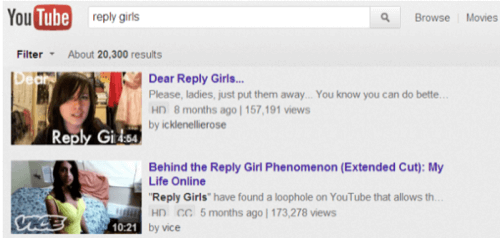
The YouTube community is still feeling the aftershocks of last Spring’s “Reply Girls” controversy, as the video giant revamps its internal search rankings to reward not just the initial click but how long a video is watched.
The Reply Girls Controversy
Announced in an official blog post last week, this tweak is part of YouTube’s “ongoing efforts to focus our video discovery features on watch time,” which sounds innocent enough. The blog post goes on to mention that the update is part of site changes that began in March. For those in the know, March was when “Tittiepocalypse,” aka the Reply Girls controversy, blew up.
Throughout half of 2011 and early 2012, YouTube’s Related Videos section was overrun with videos of push-up-bra-wearing women baring their cleavage for YouTube profit. These women weren’t just using their breasts for click-candy to drive traffic, they were also employing various SEO tactics, including tag manipulation.
Manipulating Related Videos
The video-sharing community grew frustrated by the Reply Girls and their new way of doing the YouTube business (not to mention the lack of actual “related” content in Related Videos), and protested online so ferociously in February that YouTube decided to change not just how Related Videos are selected, but also what consitutes a “view” of a video.
The Reply Girls, who got their name from how each of their videos was framed as a “reply” to the latest trending video, exploited YouTube’s system of awarding ad revenue based on initial clicks. At the height of their power, some Reply Girls were making upwards of $10,000 a month from YouTube, purely from what the company would later categorize as “spam.”
Much Has Changed
The Reply Girls controversy is responsible for YouTube’s overhaul of its tags system, how a view is calculated, how Related Videos work and now how YouTube ranks videos in search.
The blog post announcing the change doesn’t officially refer to the breast-filled controversy by name, instead links to a previous blog post that writes “(Cleavage thumbnails, anyone?).”
YouTube has never actually issued a public statement on the Reply Girls; it’s rather embarassing for the company that young women were allowed to exploit YouTube’s algorithms for eight months – without hacking – for maximum profit. (It is also against YouTube policy to comment on individual partners.)
YouTubers Still Not Happy
Like previous site changes, many YouTubers weren’t particularily thrilled with the news, nor could they understand how this change affects creators of shorter, less-than-five-minute videos (the company’s post – hardly more than a paragraph – held few details).
Others thought revamping the algorithm was unnecessary. Sochii Kamiya and Andelia Rehauste wrote in a comment on Monday, “[I]nstead of doing stupid updates, how about actually SOLVING glitches like the subscribers issue since [M]arch?”

















